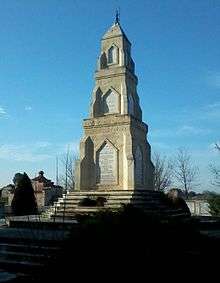Balkan Wars Memorial Cemetery in Edirne
The Balkan Wars Memorial Cemetery in Edirne (Turkish: Edirne Balkan Savaşı Şehitliği), located at Sarayiçi quarter of Edirne, Turkey, is a memorial burial ground for Ottoman military personnel of the Balkan Wars (1912–1913), who were killed in action during the Siege of Adrianople (1912–13). It was opened to public on January 14, 1994.
| Balkan Wars Memorial Cemetery in Edirne | |
|---|---|
Edirne Balkan Savaşı Şehitliği | |
| Turkey | |
Monument of Unknown Soldier in front of the Balkan Wars Memorial Cemetery in Edirne. | |
| For Turkish military and civilian casualties | |
| Established | January 14, 1994 |
| Location | 41.69085°N 26.55733°E Sarayiçi near |
| Designed by | Nejat Dinçel |
| Burials by war | |


Situated on the west bank of the Tunca north of Edirne, the memorial cemetery is laid out over 858 m2 (9,240 sq ft). Designed by architect Nejat Dinçel and built as a Tomb of the Unknown Soldier, it contains in twelve blocks the names of 100 officers and 400 soldiers on plaques.
In front of the memorial cemetery, an unknown-soldier monument with a bronze statue of an Ottoman soldier (Turkish: Mehmetçik) is erected, which was created by sculptor Tankut Öktem. The reliefs in the memorial depicting the Balkan Wars are of Metin Yurdanur.
Background
After Edirne (then known in English as "Adrianople"[1]) was captured by the Bulgarian 2nd Army on March 26, 1913, Turkish prisoners of war (POW) were put in a camp at Sarayiçi, who were treated with brutality.[2] Around 10,000 POWs died due to cold, sickness and starvation.[3] Only the names of few military personnel could be determined from the records of the General Staff.
On March 26, 2015, the 102nd anniversary of the fall of the city was commemorated at the memorial cemetery.[4]
References
- Romein, Jan (translated by R. T. Clark). The Asian Century: A History of Modern Nationalism in Asia (De eeuw van Azie). University of California Press, 1962. p. 170. "In 1930 geographical names were 'turkicized'. [...] Adrianople Edirne, and so on."
- Jews, Turks, Ottomans: a shared history, fifteenth through the twentieth century, Avigdor Levy, page 187, 2002
- "Balkan Şehitleri 26 Mart'ta anılacak". Edirne Hudut (in Turkish). 2015-03-25. Retrieved 2015-05-14.
- "Balkan Şehitleri anıldı!". Habertürk (in Turkish). 2015-03-26. Retrieved 2015-05-14.
External links
| Wikimedia Commons has media related to Balkan Wars Memorial Cemetery in Edirne. |